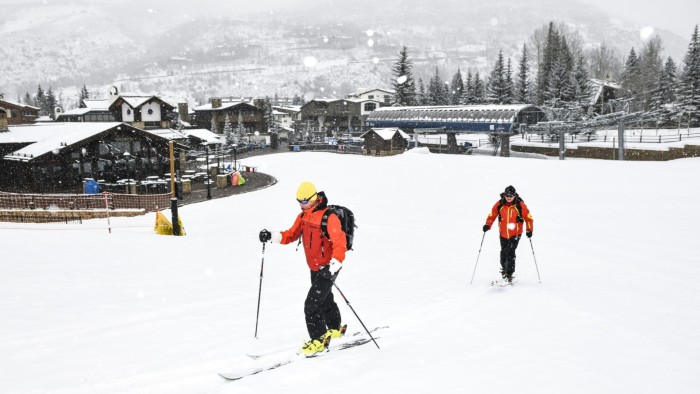Unlock the Editor’s Digest for free
Roula Khalaf, Editor of the FT, selects her favourite stories in this weekly newsletter.
Climate change may turn the ski industry into the equivalent of a melting ice cube. But until then, Wall Street is determined to skim as much cold hard cash as it can from the slopes.
Earlier this week, Vail Resorts settled a labour dispute with the Park City Professional Ski Patrol Association, a labour union that represents workers at a Utah mountain controlled by the publicly traded Vail Resorts. Social media through the holidays had been filled with images of long lines and unhappy skiers at Park City suffering through the thinly staffed venue.
Like Park City’s towering Jupiter Peak itself, the ski industry’s quirky structure has been carved over time. Once an industry of independent operators who largely catered to middle-class skiers, the US market is now dominated by two players — Vail and Alterra Mountain.
Each has rolled up ski resorts across America to create integrated national networks. Vail Resorts now has about 40 North American locations and even a few in Europe and Australia. Its present form can be traced to a leveraged buyout organised by Apollo Global Management more than 30 years ago.
The ski duo’s chief strategy is to nudge skiers away from daily fee lift tickets and into season-long “passes”. They also push expensive add-ons from equipment rentals to food and accommodations. For the well-heeled power user, the bundling can make sense. But increasingly even affluent Americans are realising it is cheaper to book European ski excursions than to jet to the Rockies.
The Wall Street logic is pretty solid. Revenue based on daily walk-up skiers is erratic given variability in weather conditions, a risk that has been exacerbated by a warming climate. Vail’s roughly $1,000 season pass, known as Epic, locks in revenue. Ditto the Ikon pass offered by Alterra, which is held by the private equity firm KSL Partners. Passes made up a quarter of Vail revenue in 2008; now it’s 65 per cent.
The union said it had secured a $23/hour base wage for patrollers up from the current $21/hour. Vail had previously said patroller pay had jumped 50 per cent in total in recent years. The company maintains that its staff is treated better than ever. Regardless of the balance of power, the cost of doing business has shot up. For customers, that means higher prices.
Vail and its backers would argue that skiers are better off for its efforts, and its professionalised management. The company’s enterprise value is about $10bn — triple what it was a decade ago. Still, many skiers pine for the days when they could drive up to the mountain and pay less than $100 for a day on the slopes, instead of the several hundred dollars today. Now they pay more and get more, whether they want it or not.
Read the full article here

